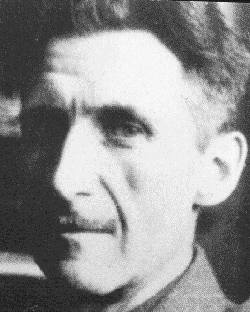 George Orwell / Eric Blair
George Orwell / Eric Blair
George Orwell
 George Orwell / Eric Blair
George Orwell / Eric Blair
A democratic socialist, a libertarian, an anti-imperialist; for some years a member of the
ILP, and a columnist for the Labour journal Tribune; later a (critical) leftwing supporter of the Labour Party."1984" is still commonly misinterpreted, especially in America. "1984" is an attack on totalitarianism of all kinds (including both Stalinism and fascism); it is also an attack on the totalitarian outlook common among intellectuals, and on the totalitarian tendencies inherent in modern capitalist culture (e.g. mass advertising and mass media and all their lies).
"1984" is not an attack on socialism. (Actually, "1984" is very positive about socialism, though in a very oblique way - proof.) Orwell remained a committed socialist to the very end of his life. But he definitely did not believe that the USSR was a socialist society. (After all, the principles of socialism are liberty, equality, and fraternity, and the Soviets betrayed the very first of these principles fundamentally.) Orwell was a democratic socialist, a radical egalitarian and a libertarian.
He was also strongly anti-Soviet (unusually so - indeed, it was hard for him to find a publisher for "Animal Farm" because rightwing pro-government publishers did not want to upset Britain's Soviet allies during World War Two). He wrote often about Soviet propaganda and its evils, and about the totalitarianism of the Soviet regime. But, again, it did not end there. Orwell was also strongly condemnatory of media manipulation, advertising techniques, authoritarianism and propaganda at home as well as abroad, and fascism in all its forms. He opposed censorship and was a true champion of freedom.
At the same time, he was also a champion of equality. He did not buy the conservative lie that freedom and equality are incompatible. His was the socialist view, that liberty and equality are mutually reinforcing values, and vital ones.
©1998 Richard Pond